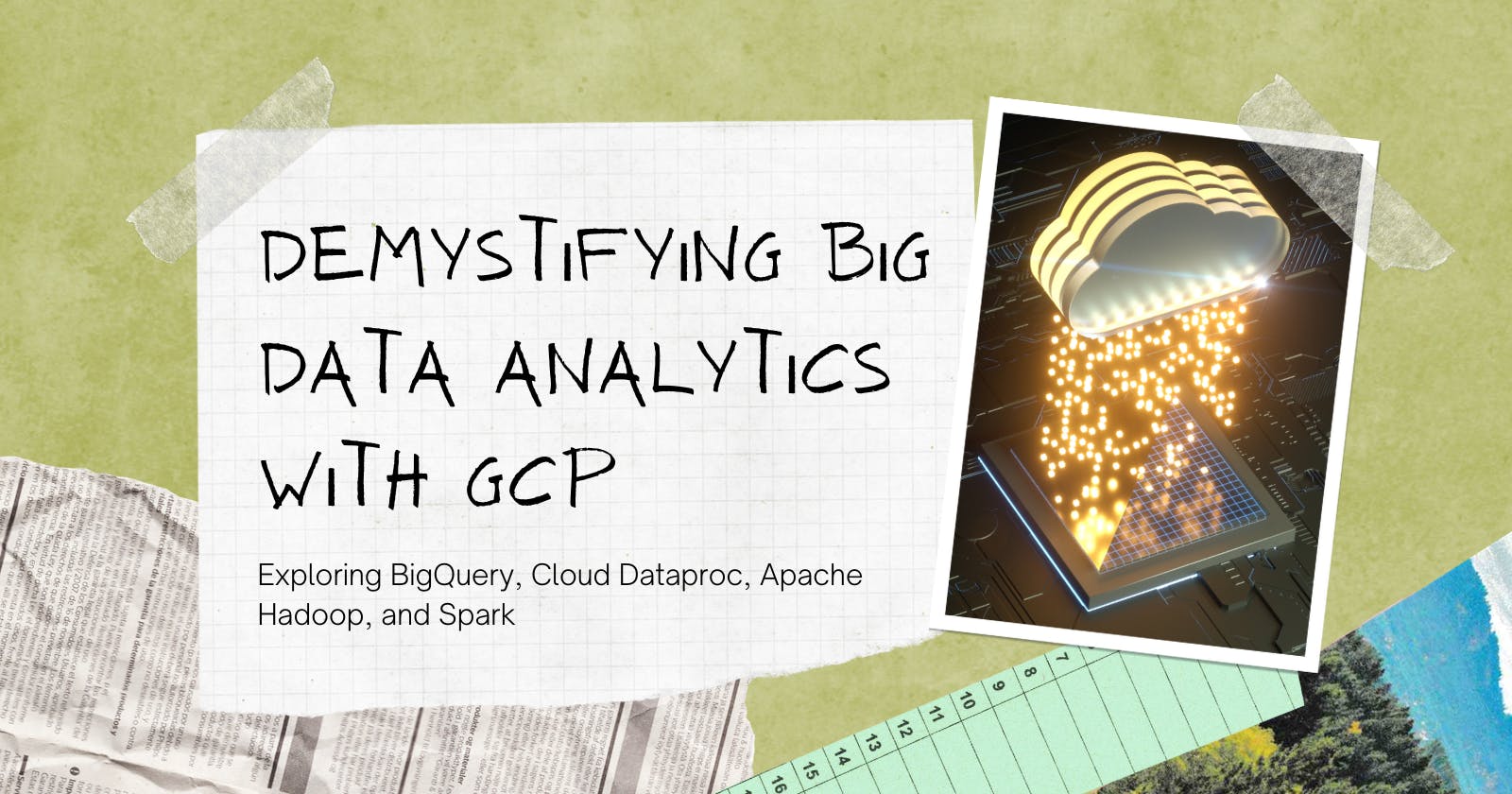Demystifying Big Data Analytics with GCP
Exploring BigQuery, Cloud Dataproc, Apache Hadoop, and Spark
Welcome to the 15th iteration of our series "Cloud Concepts Demystified with GCP"! In this article, we'll be exploring the exciting world of big data analytics and how GCP's powerful tools, including BigQuery, Cloud Dataproc, Apache Hadoop, and Spark, can help businesses process and analyze large datasets with ease. So buckle up and get ready for an engaging and candid journey through the world of big data analytics with GCP!
Introduction:
The rise of big data has transformed the way businesses operate. With massive amounts of data being generated every day, businesses need powerful tools to manage and analyze this data. Google Cloud Platform (GCP) offers several powerful tools for processing and analyzing large datasets, including BigQuery, Cloud Dataproc, Apache Hadoop, and Spark. In this article, we will explore these tools in detail and show you how you can use them to gain valuable insights into your data.
What is Big Data?
Before we dive into the technical details of BigQuery, Cloud Dataproc, Apache Hadoop, and Spark, it's important to understand what big data is and why it matters. Big data refers to extremely large and complex datasets that cannot be processed using traditional data processing methods. These datasets can come from a variety of sources, including social media, web logs, and IoT devices.
The Importance of Analyzing Big Data: Analyzing big data is essential for businesses that want to gain insights into their customers, products, and operations. By analyzing large datasets, businesses can identify trends, make informed decisions, and improve their bottom line. However, analyzing big data requires powerful tools that can handle the volume and complexity of the data.
BigQuery:
A Powerful Tool for Analyzing Large Datasets BigQuery is a serverless, cloud-native data warehouse that allows businesses to store and analyze massive amounts of data quickly and easily. With BigQuery, businesses can query petabytes of data in seconds, making it an ideal tool for analyzing large datasets.
Working with BigQuery:
To work with BigQuery, you'll need to create a dataset and a table. You can then load data into the table using various methods, including file upload, streaming, and Google Cloud Storage. Once your data is loaded, you can use SQL to query the data and extract valuable insights.
Advanced Analytics with BigQuery:
BigQuery offers several advanced analytics features, including machine learning and data visualization. With machine learning, businesses can build predictive models that can help them make better decisions. With data visualization, businesses can create stunning visualizations of their data that make it easy to understand and act upon.
Cloud Dataproc:
Processing Big Data with Apache Hadoop and Spark Cloud Dataproc is a fully managed service that allows businesses to run Apache Hadoop and Spark clusters in the cloud. With Cloud Dataproc, businesses can process big data quickly and easily without having to worry about managing infrastructure.
Setting up a Cloud Dataproc Cluster:
To set up a Cloud Dataproc cluster, you'll need to create a cluster and specify the number and type of virtual machines you want to use. You can then install software, such as Apache Hadoop and Spark, and configure the cluster to meet your specific needs.
Processing Data with Hadoop and Spark:
Apache Hadoop and Spark are powerful tools for processing big data. With Hadoop, businesses can store and process massive amounts of data using distributed computing. With Spark, businesses can process data quickly and efficiently using in-memory computing.
Best Practices for Working with Big Data:
Working with big data can be challenging, but there are several best practices you can follow to make the process easier. These include optimizing queries, managing resources, and ensuring data security and privacy.
Conclusion:
Big data analytics is a powerful tool for businesses that want to gain insights into their data. With GCP, businesses have access to several powerful tools, including BigQuery, Cloud Dataproc, Apache Hadoop, and Spark. By using these tools, businesses can process and analyze large datasets quickly and easily, making it possible to make informed decisions and improve their bottom line.
